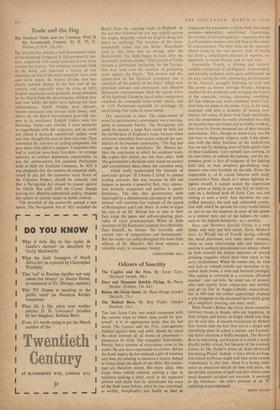Odours of Sanctity
Days and Moments Quickly Flying. By Perry Madoc. (Collins, 13s. 6d.)
THE late Joyce Cary was much concerned with the various ways in which man could be 'pos- sessed'; it is an appropriate irony that his last novel, The Captive and the Free, courageously finished against time and oddS, should be about the most extreme of all forms of possession— possession by God. The evangelist faith-healer, Preedy, has a number of miraculous cures to his credit. He also has a reputation as a lecher. Before the book begins, he has seduced a girl of fourteen and then, by refusing to summon a doctor, helped to bring about the death of her child. His creden- tials are therefore mixed. His many allies, who range from retired colonels seeking a sign to reporters seeking a stunt, exult in his supposed powers and claim that he abandoned the ways of the flesh years before, when he was converted, as swiftly, inexplicably and finally as Saul or Augustine, by a preacher in Hyde Park. His many enemies—rationalists, established Churchmen, the brother of the outraged girl—maintain that he is a fraudulent menace who still lives in the odour of concupiscence. The plot turns on the vigorous efforts made by the two parties, both of which act from a complicated mixture of motives, re- spectively to boost Preedy and to ruin him.
Meanwhile Preedy, a striking and entirely credible compound of intelligence, showmanship and brutally authentic faith, goes indifferently on his way, curing the sick, embezzling the donations to his Mission, savagely believing in God and His power as shown through Preedy; bringing comfort to the desperate and ravaging the homes of the reputable; rutting, chastising, mouthing. All this without any overt comment from Cary. And here we come to the point. Cary, in his time, recorded with love a diversity of human con- ditions; but many of these were freak conditions, and the proposition he really cherished was that all inspired men are crazed and probably crooked, that those by Power possessed are of their natures semi-lunatic. Thus, though we know Cary was the last man to denigrate religion, such is his obses- sion with the sheer battiness of the God-driven that we end by thinking more of their quirks than of their Godliness. Cary himself says nothing, in his own voice, to redress the balance, and the im- pression given is that all religions of the fighting kind take as their prophets gin-stinking ring- masters who own brothels on the side. (Even the respectable C. of E. curate behaves with seedy eccentricity.) Now, much as I detest fighting re- ligions myself, I cannot accept the impression Cary gives as being in any way fair or valid ex- cept on a declared level of farce. Cary was not writing at such a level. And therefore the con- trolled intensity, the cool and unhurried convic- tion with which he spreads his crazy world before us, are to me the measure at once of his power as a creator here and of his failure—by refer- ence to the highest standards—as a novelist.
Days and Moments Quickly Flying is a very funny and very sad 'first novel. Perry Madoc's hero, by Waugh out of Powell, having suffered the usual dismissals and rows about cheques, takes on some entertaining jobs and liaisons— until he is suddenly precipitated into prison, where he finds himself the distant spectator of several grinding tragedies which have their roots in his early fecklessness'. When he comes out, he tries and fails to commit suicide and thereafter is re- ceived back home, a wise and battered prodigal. This ending is conveyed in a curiously offensive manner : one can take the usual run of sinners, who turn saintly from exhaustion and debility and go to live in Anglo-Catholic monasteries; but in this case the author approvingly displays a wry smugness in his chastened hero which gives off a singularly piercing and nasty smell.
Hans Pump's BeYore the Great Snow concerns German troops in Russia who are beginning, in their fatigtie and terror, to forget which side they are on and why. A smooth translation by Robert Kee cannot hide the fact that this is a turgid and repetitions piece in which a sinister and fascinat- ing initial situation is badly mangled. The Ruined Boys is interesting, not because it is about a really ghastly public school, but because of the constant echoes in Mr. Fuller's prose of Scott-Moncrieff translating Proust. Indeed, a story about an Eng- lish school by Proust might well bear some remote resemblance to this one: there is a loving insis- tence on evocative details of time and place, on the terrible emotions of guilt and pity which some small domestic accident can occasion. A warning to the frivolous : the title's promise of an 'X' certificate is not redeemed. ,
SIMON RAVEN


































 Previous page
Previous page